Science
(www.olympiadsuccess.com)
Chapter 4: Materials - Metals and Non-Metals
Class: VIII
Exemplar Solutions
MULTIPLE CHOICE QUESTIONS
Question 1.
Which of the following is not a metal?
Answer 1. (b)
Question 2.
The substance that will be flattened on beating with a hammer is
(a) crystal of iodine (c) piece of coal
(b) lump of sulphur (d) zinc granule
Answer 2. (d)
Question 3.
Boojho has learnt that non-metals on beating with a hammer are generally broken into pieces. Which of the following is a non-metal?
(a) iron nail (c) copper plate
(b) aluminium wire (d) piece of coal
Answer 3. (d)
Question 4.
Materials which can be drawn into wires are called ductile. Which of the following is not a ductile material?
(a) silver (c) sulphur
(b) copper (d) aluminium
Answer 4. (c)
Question 5.
Metals are generally hard. Which of the following metals is an exception and can be cut with a knife?
(a) iron (c) gold
(b) sodium (d) magnesium
Answer 5. (b)
Question 6.
Metals are generally solid. Which of the following metals is in the liquid state at room temperature?
(a) mercury (c) aluminium
(b) silver (d) sodium
Answer 6. (a)
Question 7.
Metals generally react with dilute acids to produce hydrogen gas. Which one of the following metals does not react with dilute hydrochloric acid?
(a) magnesium (c) iron
(b) aluminium (d) copper
Answer 7. (d)
Question 8.
Which of the following reacts with cold water vigorously?
(a) carbon (c) magnesium
(b) sodium (d) sulphur
Answer 8. (b)
Question 9.
The metal which produces hydrogen gas on reaction with dilute hydrochloric acid as well as sodium hydroxide solution is
(a) copper (c) aluminium
(b) iron (d) sodium
Answer 9. (c)
Question 10.
Which of the following non-metals reacts and catches fire on exposure to air?
(a) phosphorus (c) sulphur
(b) nitrogen (d) hydrogen
Answer 10. (a)
Question 11.
Generally metallic oxides are basic and non-metallic oxides are acidic in nature. Solution of which of the following oxides in water will change the colour of blue litmus to red?
(a) sulphur dioxide (c) iron oxide
(b) magnesium oxide (d) copper oxide
Answer 11. (a)
Question 12.
Which of the following property is not responsible for copper to be used as electrical conduction wires?
(a) ductility (c) good conductor of electricity
(b) colour (d) it is solid
Answer 12. (b)
VERY SHORT ANSWER QUESTIONS
Question 13.
Name two soft metals which can be cut with a knife.
Answer 13. (i) sodium (ii) potassium
Question 14. Which non-metal is essential for our life and all living beings inhale it during breathing?
Answer 14. Oxygen gas
Question 15. Name two major non-metals which are present in fertilisers and enhance the growth of plants.
Answer 15. (i) nitrogen (ii) phosphorus
Question 16. Which non-metal is used to disinfect water?
Answer 16. Chlorine
Question 17. A purple coloured non-metal forms a brown solution in alcohol which is applied on wounds as an antiseptic. Name the non-metal.
Answer 17. Iodine
Question 18. Zinc sulphate forms a colourless solution in water. Will you observe any colour on adding copper turning in it?
Answer 18. No, because displacement reaction does not takes place.
Question 19. Why are bells made of metals?
Answer 19. Metals are sonorous.
Question 20. Which liquid metal is used for making thermometers?
Answer 20. Mercury
Question 21. Which of the following metals can displace the other two metals from their salt solutions?
zinc, iron, copper.
Answer 21. Zinc
SHORT ANSWER QUESTIONS
Question 22. Paheli bought a statue made of copper. To her surprise it acquired a dull green coating after a couple of months. Explain the reason.
Answer 22. The green material is a mixture of copper hydroxide and copper carbonate formed due to reaction of copper with moist air (water, oxygen and carbon dioxide).
Question 23. In Fig 4.1 you find that the bulb glows when an iron nail is placed between two ends of wire. Complete the following sentences on the bases of this fact.
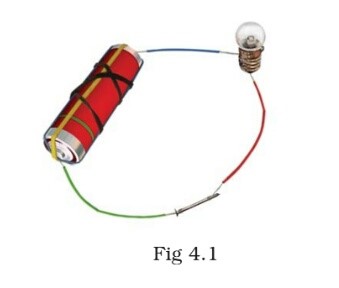
(a) __________ is a metal.
(b) Metals are good __________ of electricity.
Answer 23. (a) iron (b) conductor
Question 24. If in Fig. 4.1 iron nail is replaced by a wooden stick, will the bulb glow or not? Justify your answer.
Answer 24. The bulb will not glow as wood is not a good conductor of electricity.
Question 25. Paheli prepared a blue coloured solution of copper sulphate in beaker A and placed an iron nail in it. Boojho prepared a yellowish green solution of ferrous sulphate in beaker B and placed a copper wire in it. What changes will they observe in the two beakers after an hour?
Answer 25. In beaker A, a reddish brown layer of copper will deposit on the iron nail and the blue coloured solution will become yellowish green.
On the other hand, no change is observed in beaker B.
Question 26. A doctor prescribed a tablet to a patient suffering from iron deficiency. The tablet does not look like iron. Explain.
Answer 26. The tablet is not made of iron metal, instead it contains a salt of iron.
Question 27. Match the substances in Column A with their applications given in Column B.
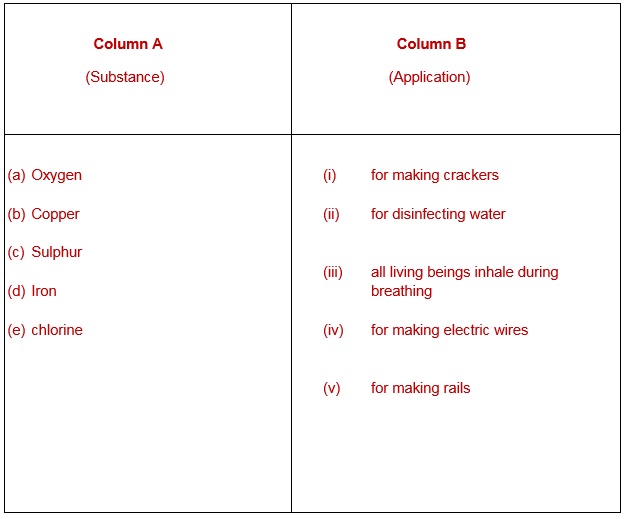
Answer 27.
(a)-(iii), (b)-(iv), (c)-(i), (d)-(v), (e)-(ii).
LONG ANSWER QUESTIONS
Question 28. Some of the following statements are incorrect. Find the incorrect statements and correct them.
(a) The property of metals by virtue of which they can be drawn into wires is called ductility.
(b) Metals are good conductor of electricity but poor conductor of heat.
(c) Articles made of metals produce ringing sound when struck hard.
(d) Oxides of non-metals and metals are acidic in nature.
(e) A less reactive metal replaces a more reactive metal from its salt solution in water.
Answer 28.
Statements (b), (d) and (e) are not correct.
(b) Metals are good conductor of electricity and also good conductor of heat.
(d) Oxides of non-metals are acidic in nature and oxides of metals are basic in nature.
(e) A more reactive metal replaces a less reactive metal from its salt solution in water.
Question 29. Iron is more reactive than copper. Can you write an activity to show this?
Answer 29. Hint: Write the activity based on the fact that when an iron nail is put in a beaker containing copper sulphate solution, iron replaces copper from the solution, since it is more reactive. Copper metal and iron sulphate are the products which are obtained as a result of the chemical reaction.
Question 30. Fill in the blanks to complete the following paragraph.
The name of the product formed in the reaction of sulphur and _____________ is sulphur dioxide gas. When sulphur dioxide is dissolved in_________________, sulphurous acid is formed. The sulphurous acid turns _____________ litmus paper to ____________. Generally oxides of __________ are acidic in nature.
After completing the paragraph write two questions which you can raise on the basis of this information.
Answer 30. Oxygen, water, blue, red, non-metals.
Questions maybe
(i) Which gas is formed when sulphur reacts with oxygen?
(ii) What is the nature of oxides of non-metals?
Question 31. Find out the names of three metals and three non-metals from the box given as Fig 4.2.
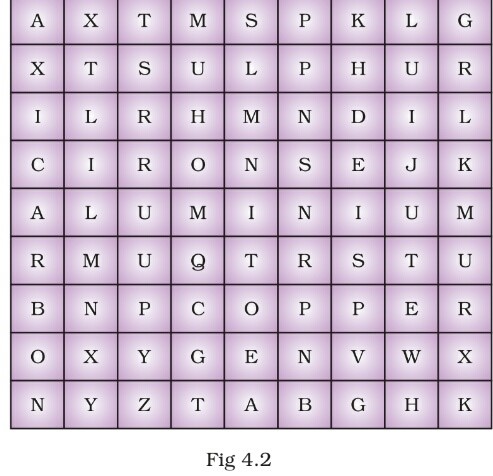
Answer 31.
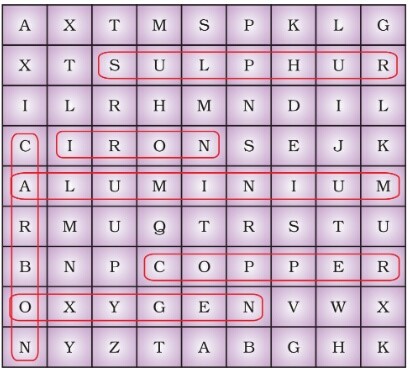
Metals Non-metals
Iron Carbon
Copper Oxygen
Aluminium Sulphur
Question 32. Complete the crossword given in Fig. 4.3 with the help of the clues.
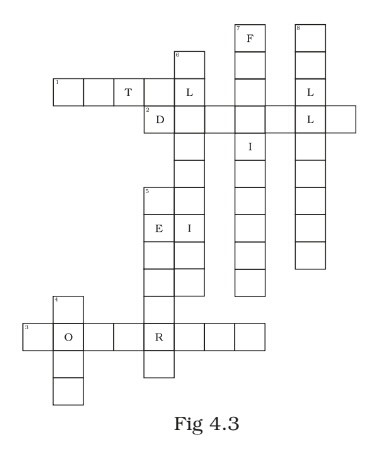
Across
Down
Answer 32.
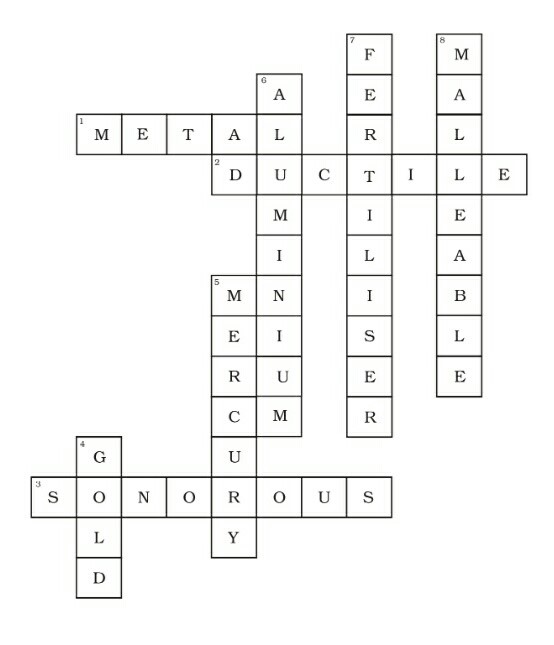
Yearlong program for Olympiads preparation & to build necessary skills for future.
Explore More
Time to mark your calendar with the upcoming Olympiads exam schedule.
Explore More
Take your Olympiad preparation to next-level by taking LIVE Classes.
Explore More
Assess your performance by taking topic-wise and full length mock tests.
Explore More
Online tuitions for international compeitions like SASMO, SEAMO, etc for Grades 1-11.
Explore More